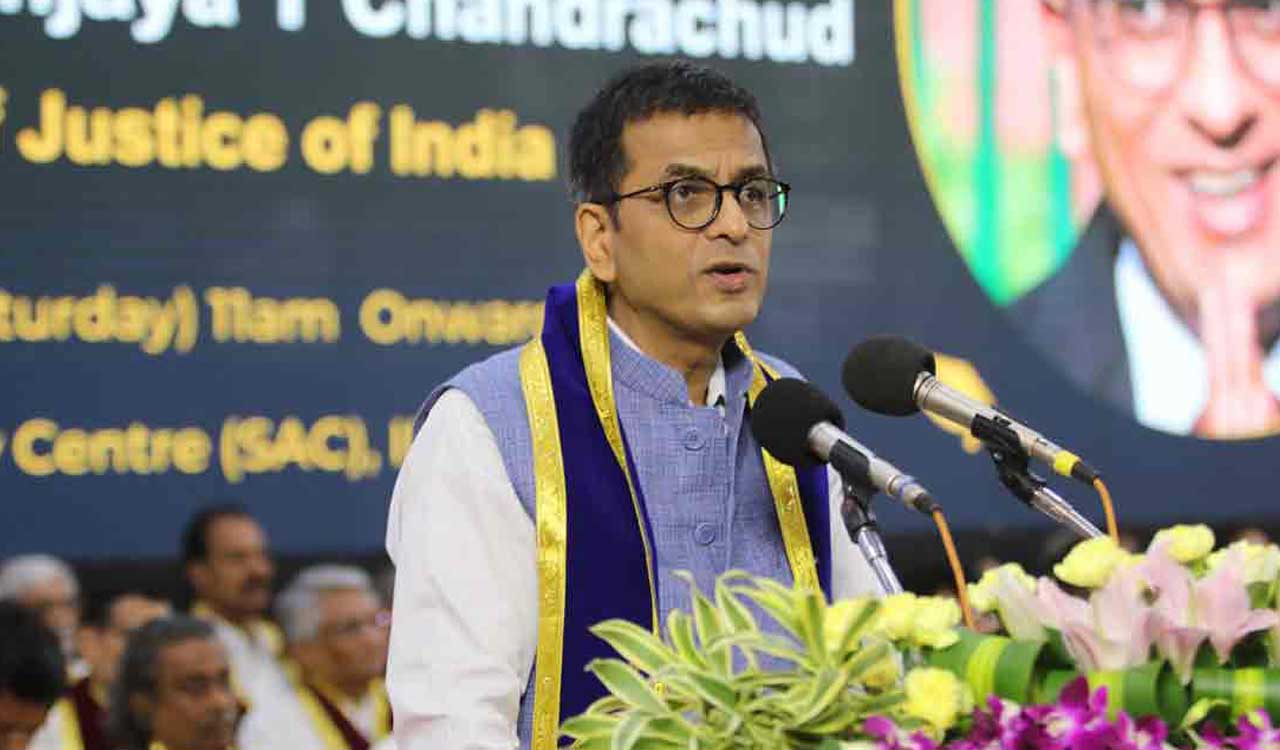New Delhi: Chief Justice of India DY Chandrachud on Saturday said it must be ensured that the justice system, from the police stations to the courtrooms, understands and responds to the compounded vulnerabilities of children with disabilities.
Speaking at the ninth National Annual Stakeholders Consultation on Child Protection, the CJI said the challenges faced by persons with disabilities extend far beyond issues of physical accessibility and they must also contend with entrenched societal biases, stereotypes and misconceptions that permeate nearly every facet of life.
“We must ensure that the justice system, from the police stations to the courtrooms, understands and responds to the compounded vulnerabilities of these children. The incorporation of restorative justice approaches is one such solution. The JJ Act (Juvenile Justice Act) outlines various rehabilitation and reintegration measures for children in conflict with the law such as counselling, education, vocational training and community service. For children with disabilities, these measures can be adapted to ensure they receive the specialised support they need to thrive,” he said.
The two-day programme was organised under the aegis of Juvenile Justice Committee of the Supreme Court in association with UNICEF, India.
Union Minister for Women and Child Development Annpurna Devi gave the special address for the two-day programme, while the opening remarks was given by Justice BV Nagarathna, who is also the chairperson of the Juvenile Justice Committee of the Supreme Court. Country representative of Unicef, India Cynthia McCaffrey, gave the introductory address on the topic.
The CJI said the challenges faced by persons with disabilities extend far beyond issues of physical accessibility and “they must also contend with entrenched societal biases, stereotypes, and misconceptions that permeate nearly every facet of life”.
“When we talk about juvenile justice, especially in the context of children with disabilities, we cannot ignore the concept of intersectionality. Disability often intersects with other marginalised identities such as gender, caste, socio-economic status, and ethnicity, amplifying the discrimination children face,” he said, adding the doctrine of intersectionality highlights how multiple identities intersect to create unique experiences of discrimination.
Highlighting that for children with disabilities, these compounded vulnerabilities can have devastating effects, the CJI stressed the state must ensure that children with disabilities are provided additional safeguards, recognizing that they face heightened risks and unique challenges.
“We must ensure that our legal, social and institutional systems are designed not just to accommodate, but to actively protect and empower these children,” he added.
CJI Chandrachud further said when we talk about juvenile justice, especially in the context of children with disabilities, the concept of intersectionality cannot be ignored.
“Disability often intersects with other marginalised identities such as gender, caste, socio-economic status, and ethnicity, amplifying the discrimination children face,” he said, adding that for children with disabilities, these compounded vulnerabilities can have devastating effects.
CJI Chandrachud, who fosters two young daughters with special needs, recounted the challenges faced by disabled children, expensive medical tests and treatment and costly equipment.
“This year’s theme holds a special place in my heart: the protection and well-being of children with disabilities. As someone who fosters two wonderful young daughters, I am reminded daily of the joy, purpose, and love they bring into my life. They have transformed not only how I see the world but also how I engage with it — strengthening my commitment to creating a more inclusive society where every child, regardless of their abilities, is cherished and protected,” the CJI said.
Underscoring that traditionally, caregiving has been an often-overlooked and thankless task, shaped by patriarchal norms that have historically placed the burden of care squarely on families, CJI Chandrachud said the unique needs of persons with disabilities are still, in many cases, viewed as a private, domestic issue rather than a collective, social responsibility.
While we may advocate for these needs to be met by our social institutions, those institutions often fall short of providing the support that is truly needed, he said.
The CJI, along with the union minister and Justice Nagarathna and representative of the UNICEF released a ‘Handbook on Persons with Disabilities’, which aims to aid and sensitise not only the legal community but also society at large in using inclusive terminology when referring to disabilities.
“Engaging with stereotypes and biases is crucial, as these can subtly influence legal proceedings — whether in the assumptions made about the capacity of a child with disabilities to testify or in the way their credibility is assessed. In line with our commitment to accessibility, the ‘Handbook’ will also be released in Braille and as an audiobook, ensuring that it is available to all, regardless of their abilities,” the CJI announced.




















